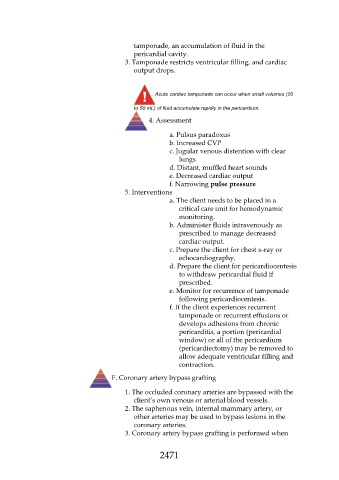Page 2471 - Saunders Comprehensive Review For NCLEX-RN
P. 2471
tamponade, an accumulation of fluid in the
pericardial cavity.
3. Tamponade restricts ventricular filling, and cardiac
output drops.
Acute cardiac tamponade can occur when small volumes (20
to 50 mL) of fluid accumulate rapidly in the pericardium.
4. Assessment
a. Pulsus paradoxus
b. Increased CVP
c. Jugular venous distention with clear
lungs
d. Distant, muffled heart sounds
e. Decreased cardiac output
f. Narrowing pulse pressure
5. Interventions
a. The client needs to be placed in a
critical care unit for hemodynamic
monitoring.
b. Administer fluids intravenously as
prescribed to manage decreased
cardiac output.
c. Prepare the client for chest x-ray or
echocardiography.
d. Prepare the client for pericardiocentesis
to withdraw pericardial fluid if
prescribed.
e. Monitor for recurrence of tamponade
following pericardiocentesis.
f. If the client experiences recurrent
tamponade or recurrent effusions or
develops adhesions from chronic
pericarditis, a portion (pericardial
window) or all of the pericardium
(pericardiectomy) may be removed to
allow adequate ventricular filling and
contraction.
F. Coronary artery bypass grafting
1. The occluded coronary arteries are bypassed with the
client’s own venous or arterial blood vessels.
2. The saphenous vein, internal mammary artery, or
other arteries may be used to bypass lesions in the
coronary arteries.
3. Coronary artery bypass grafting is performed when
2471

